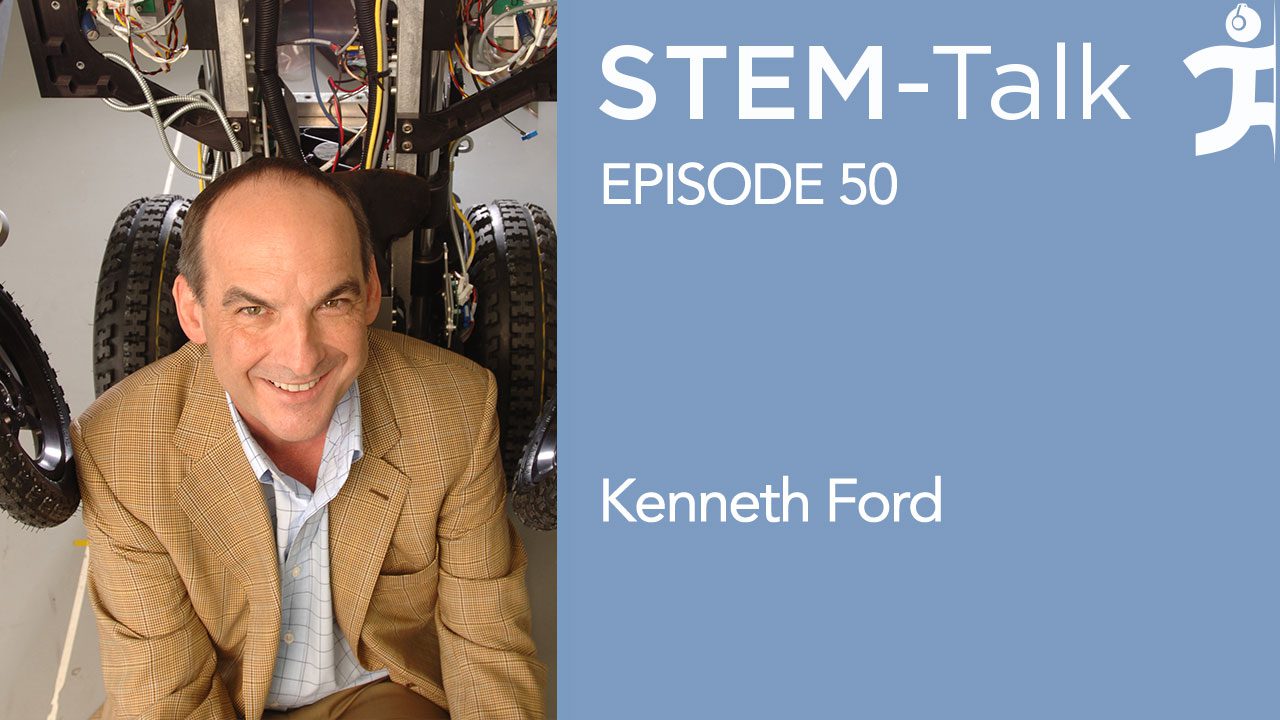STEM-Talk
Episode 50: Ken Ford talks about ketosis, optimizing exercise, and the future direction of science, technology, and culture
// Nov 7, 2017

Today’s episode features the second of Dawn Kernagis’ two-part interview with her STEM-Talk co-host and IHMC Director Ken Ford. This episode marks a milestone for STEM-Talk. It’s our 50th episode and follows Ken’s formal induction into the Florida Inventor’s Hall of Fame.
In part one of Dawn’s interview, listeners learned about Ken’s childhood and his years as a rock and roll promoter back in the ‘70s. Ken even shared an interesting story about how he went from being a philosophy major to a computer scientist. He also talked about his work in AI and the creation of IHMC and the pioneering work underway at the institute. If you missed episode 49, be sure to check it out.
Part two of Ken’s interview focuses more on his research and personal experience with the ketogenic diet, ketone esters, exercise and ways to extend health span and perhaps longevity. Dawn and Ken also discuss the nature of technical progress
As listeners learned in part one, Ken has a varied background. He is a co-founder of IHMC, which has grown into one of the nation’s premier research organizations with world-class scientists and engineers investigating a broad range of topics.
He also is the author of hundreds of scientific papers and six books. He received his Ph.D. in Computer Science from Tulane University. He is a Fellow of the Association for the Advancement of Artificial Intelligence, a charter Fellow of the National Academy of Inventors, and a member of the Association for Computing Machinery, the IEEE Computer Society, and the National Association of Scholars.
In 2012, Tulane University named Ford its Outstanding Alumnus in the School of Science and Engineering. The Association for the Advancement of Artificial Intelligence named Dr. Ford the recipient of the 2015 Distinguished Service Award. Also in 2015, Dr. Ford was elected as Fellow of the American Association for the Advancement of Science.
In January 1997, Dr. Ford was asked by NASA to develop and direct its new Center of Excellence in Information Technology at the Ames Research Center in Silicon Valley, where he also served as Associate Center Director. In July 1999, Dr. Ford was awarded the NASA Outstanding Leadership Medal. That same year, Ford returned to private life in Florida and to IHMC.
In October 2002, President George W. Bush nominated Dr. Ford to serve on the National Science Board (NSB). In 2005, Dr. Ford was appointed and sworn in as a member of the Air Force Scientific Advisory Board. In 2007, he became a member of the NASA Advisory Council and on October 16, 2008, Dr. Ford was named as chairman – a capacity in which he served until October 201l.
In August 2010, Dr. Ford was awarded NASA’s Distinguished Public Service Medal – the highest honor the agency confers. In February 2012, Dr. Ford was named to a two-year term on the Defense Science Board and in 2013, he became a member of the Advanced Technology Board which supports the Office of the Director of National Intelligence.
Links:
IHMC website:
https://www.ihmc.us
Ken Ford web page:
https://www.ihmc.us/groups/kford/
Florida Inventors Hall of Fame website:
http://www.floridainvents.org
Outside magazine story on Ken Ford and ketogenic diet:
https://www.outsideonline.com/2113406/high-carb-low-fat-ketone-diet
Blood Flow Restriction Device. 15% discount code: IHMC
https://www.gobstrong.com/what-is-b-strong/
BhB Ketone Ester
https://hvmn.com
Powerdot Muscle Stimulator
https://www.powerdot.com/products/powerdot-muscle-stimulator
Papers:
Suppression of Oxidative Stress by b-Hydroxybutyrate, an Endogenous Histone Deacetylase Inhibitor
https://www.ihmc.us/wp-content/uploads/2017/10/Verdin_2013.pdf
Ketone Bodies as Signaling Metabolites
https://www.ihmc.us/wp-content/uploads/2017/10/TEM-Ketone-bodies-as-signaling-metabolites-2014.pdf
Ketogenic Diet Reduces Midlife Mortality and Improves Memory in Aging Mice
https://www.ihmc.us/wp-content/uploads/2017/10/Verdin-Ketogenic-Mouse-Longevity-Cell-Metab-9-17-1.pdf
A Ketogenic Diet Extends Longevity and Healthspan in Adult Mice
https://www.ihmc.us/wp-content/uploads/2017/10/Ramsey-Mouse-Longevity-Cell-Metab-9-17.pdf
Ketone Bodies Mimic the Life Span Extending Properties of Caloric Restriction
https://www.ihmc.us/wp-content/uploads/2017/11/Ketone-bodies-mimic-lifespan-extending-properties-of-CR_Veech_Review_2017.pdf
Show notes:
7:06: Dawn begins part two of her interview with Ken by pointing out that some of the work IHMC is doing in terms of human performance is focused on nutritional approaches, including ketogenic diets and ketone esters. Dawn mentions that Ken was an early adopter of the ketogenic diet and that some people even refer to him as “the keto guy.” She then asks him when he first embraced a ketogenic diet and what attracted him to it.
8:06: Ken Talks about his long experience with the ketogenic diet and its effect on body composition.
10:30: Ken discusses how he became interested in ketone esters.
12:34: Dawn asks about research that seems to show that elevated levels of circulating ketone bodies have the potential to protect people from some of the diseases of aging.
12:47: Ken discusses healthspan, lifespan, and bending the aging curve.
14:04: Ken notes that, in his view, it should not be surprising that shifting something as fundamental as the fuel substrate for our metabolism would have widespread effects.
14:19: Ken talks about the epidemic of insulin resistance, diabetes, and obesity.
15:20: Dawn asks Ken to discuss the relatively newly discovered effects of ketone bodies which go well beyond their well-appreciated metabolic roles … and that might have various anti-aging effects.
16:59: Ken asserts that many of the most exciting effects of ketones are not only those arising from their role as an energy source but also that they play critically important signaling functions. Ken talks about the research showing that the ketone bodies are HDAC inhibitors and seem to link environmental cues, such as diet, to the regulation of aging.
17:23: Ken explains how HDACs inhibit BDNF and as mentioned above, ketones inhibit HDACs … thereby increasing BDNF.
18:20: Ken discusses two new papers showing a substantial extension of healthspan and lifespan in adult mice.
20:57: Dawn asks about the effect of the ketogenic diet on the maintenance of muscle and strength as people age.
24:48: Dawn asks Ken about the ketogenic diet and IGF-1.
26:45: Dawn notes that stem cells become less effective with age and asks about the implications of this phenomenon for maintenance of muscle.
27:37: Ken explains what the ketogenic diet is.
29:48: Dawn points out the Google search term “ketogenic diet” now outnumbers searches for Paleo diets. She asks Ken if he thought this would be the case back in 2006 when he first returned to a ketogenic diet.
31:18: Dawn asks Ken about what he sees as the primary benefit of blood-flow restriction training and how he uses it in his training.
34:25: Dawn asks Ken about what other exercise methods he employs in his training to optimize muscle mass and minimize potential injury.
34:38: Ken mentions electrical muscle stimulation (PowerDot), kettlebells, resistance training, Tabata sessions, and hiking in Wyoming and Maine.
35:37: Ken discusses hierarchical sets as employed in resistance training.
36:27: Dawn ask Ken if he “goes to failure” when engaged in resistance training.
37:13: Dawn asks Ken if has any thoughts on eccentric movements when engaged in resistance training.
38:50: Dawn asks Ken about NASA funded research at IHMC, led by Peter Neuhaus, aimed at developing technology to enable exercise devices for use on long-duration deep space missions.
39:41: Dawn mentions that when she first met Ken that she was doing research on apolipoprotein E in a neurocritical care laboratory. She asks Ken for his take on APOE in athletics and other approaches when it comes to harnessing people’s genetic information for optimized health.
42:03: Dawn asks Ken to describe a typical day and a typical week in the life of Ken Ford, including what his diet looks like and what he typically eats for breakfast, lunch and dinner.
44:03: Dawn wonders how many expressos, which Ken refers to as the elixir of the mind, he drinks in a day.
45:06: Dawn asks Ken about his time at NASA’s Ames Research Center.
46:06: She asks Ken to talk about his experience on the National Science Board and whether there were any stories he could share.
48:48: Dawn asks Ken to discuss his service on the NASA Advisory Council.
50:04: Dawn mentions that Ken has been a member of the National Science Board, NASA Advisory Council, Air Force Science Advisory Board, the Advanced Technology Board for the Office of the Director of National Intelligence, and the Defense Science Board. She asks Ken for his takeaways from serving on those boards and councils.
52:10: Dawn notes that during Apollo, NASA annually accounted for roughly 4% of Federal spending and asks Ken if he knows the percentage currently?
52:55: Ken laments that public service is becoming increasingly unpleasant … and that the best people invariably leave as a result.
54:05: Dawn asks Ken to talk about the accelerating rate of technological progress and its effects on society and the individual.
54:25: Ken distinguishes between “technological change” and “progress.”
57:11: Dawn asks, if taken from a purely technological perspective, are we not advancing faster than ever before?
1:00:54: Dawn plays an audio clip of Ken talking about the zombie apocalypse, which she describes as one of her favorite stories, and asks him to expand upon on it.
1:04:20: Dawn thanks Ken for sitting down for an interview.






